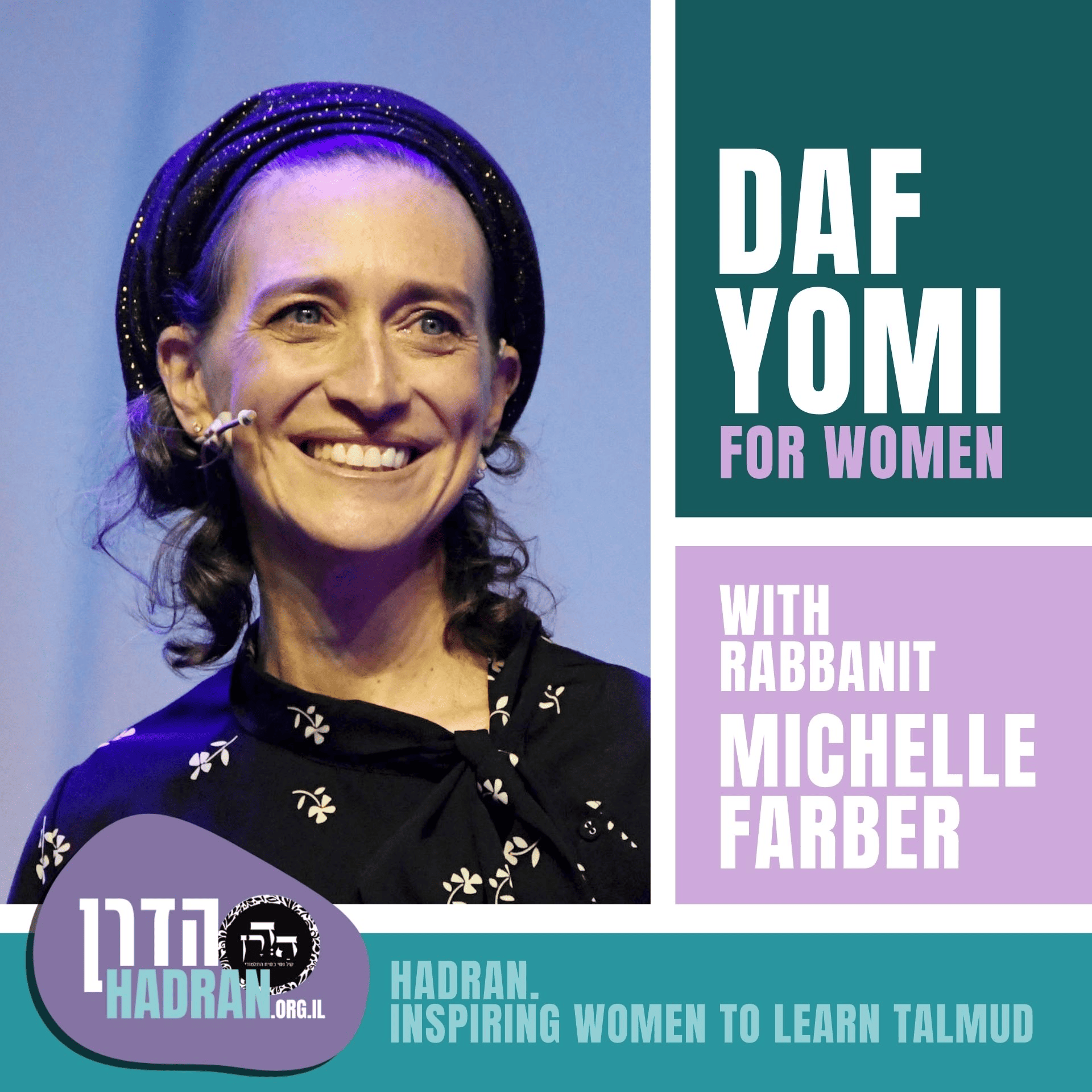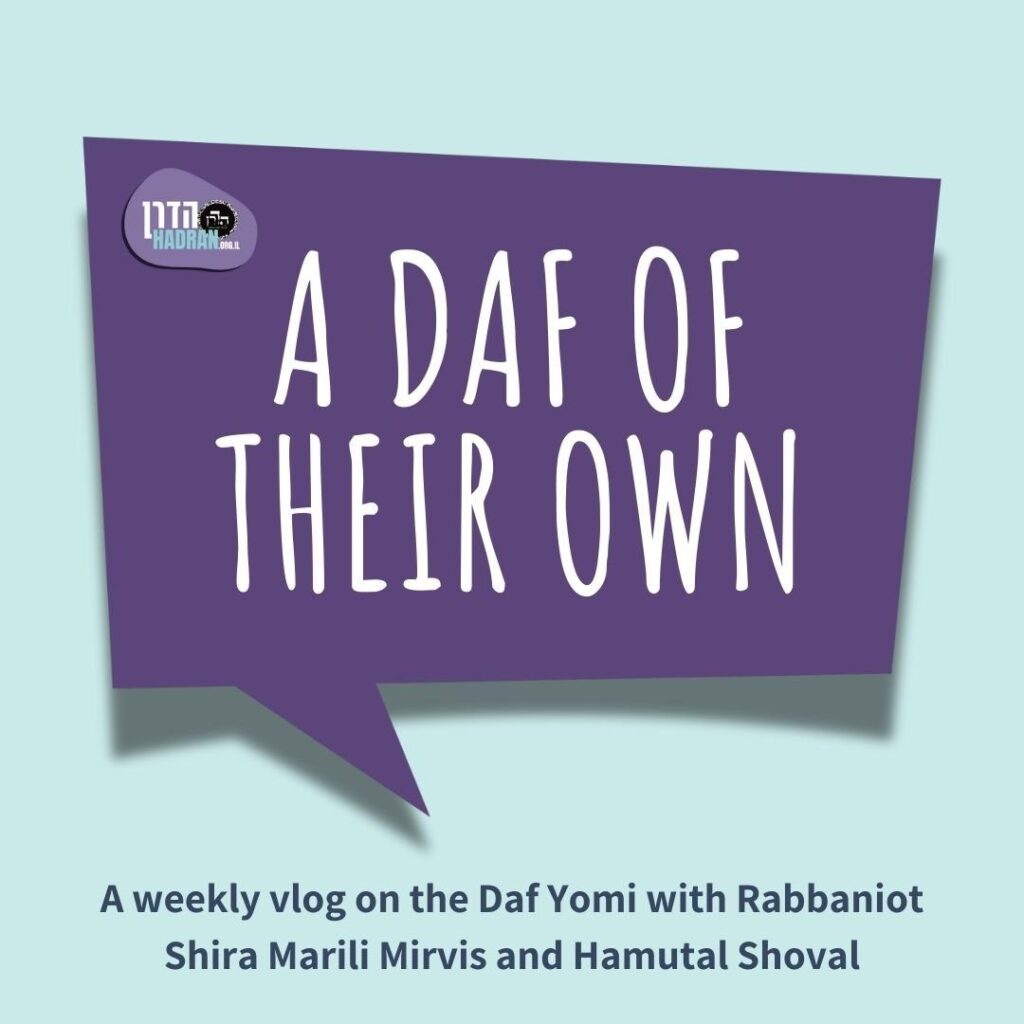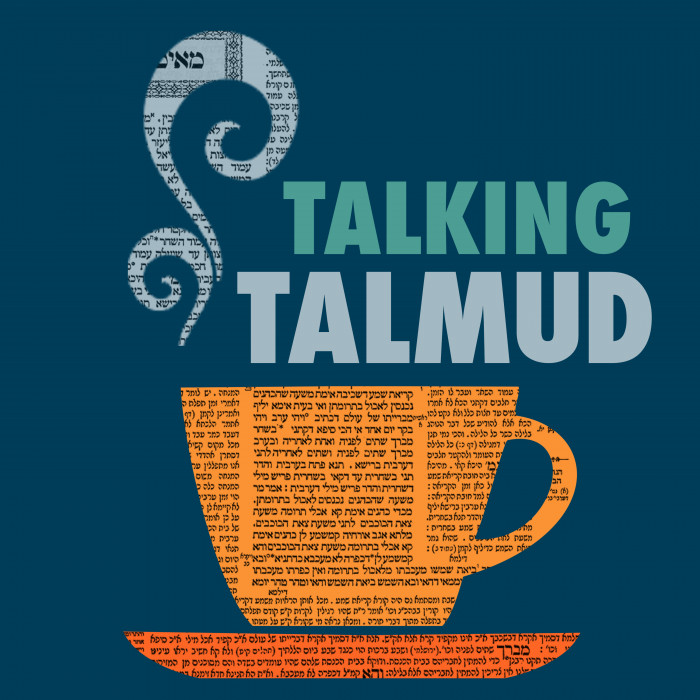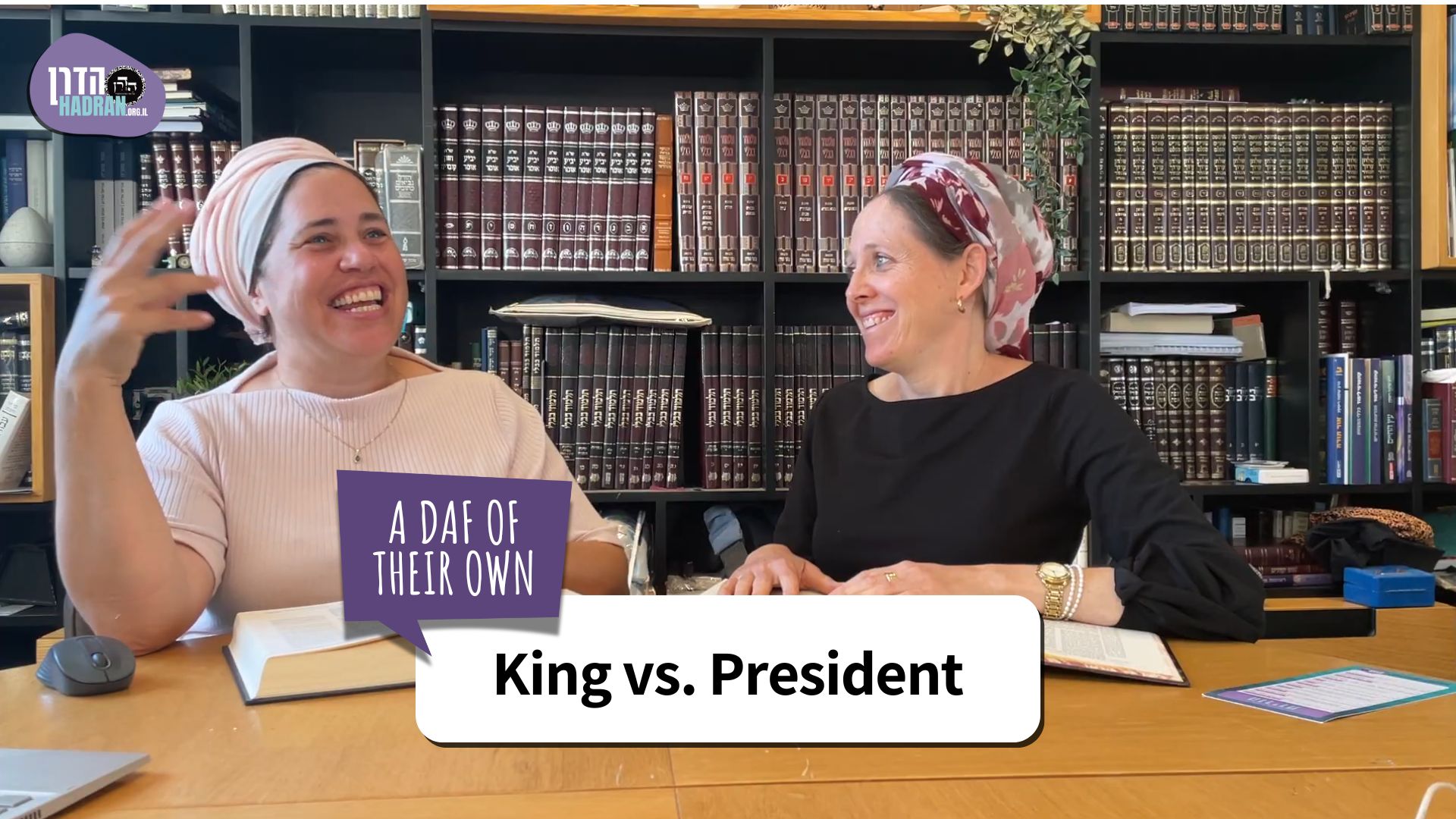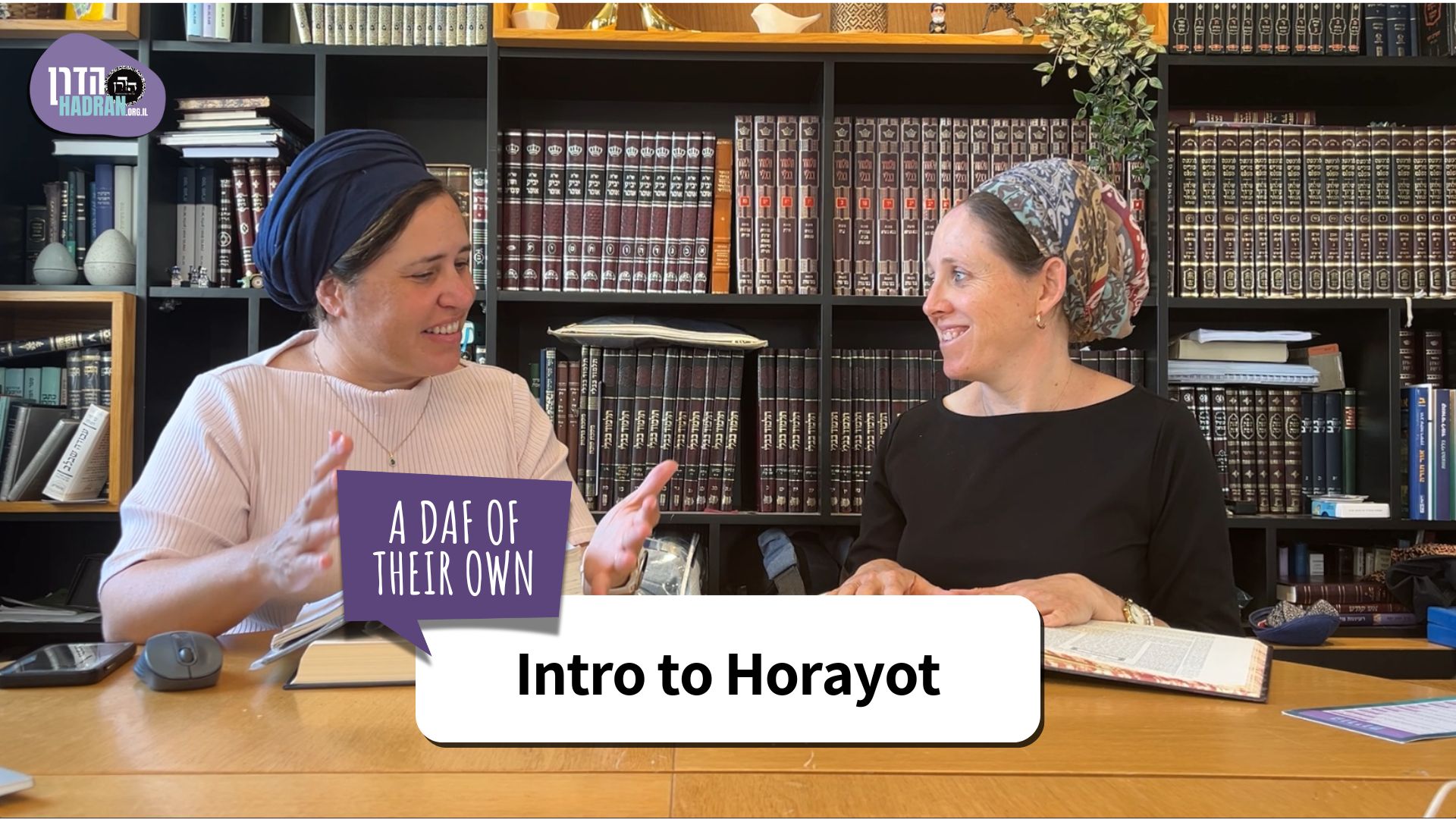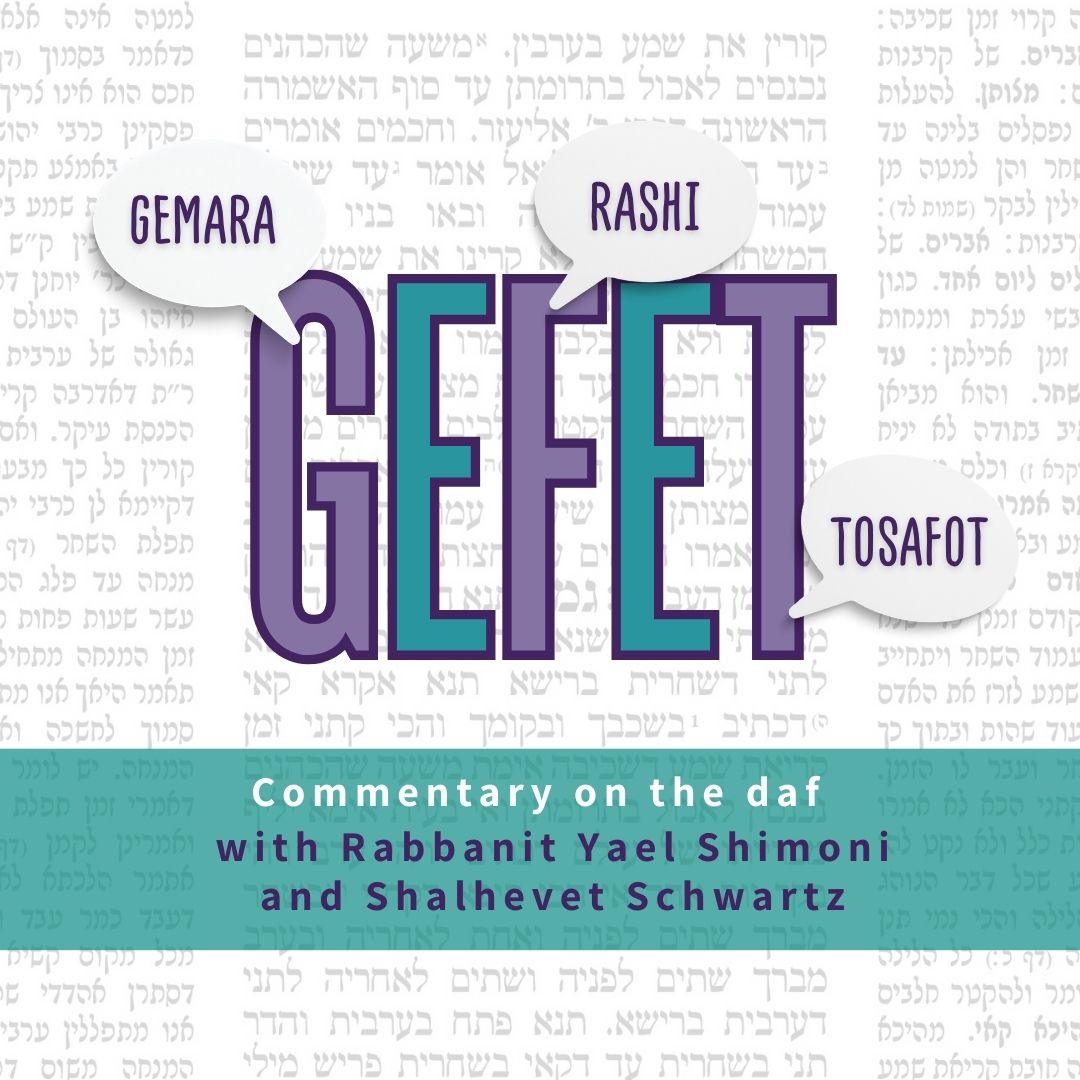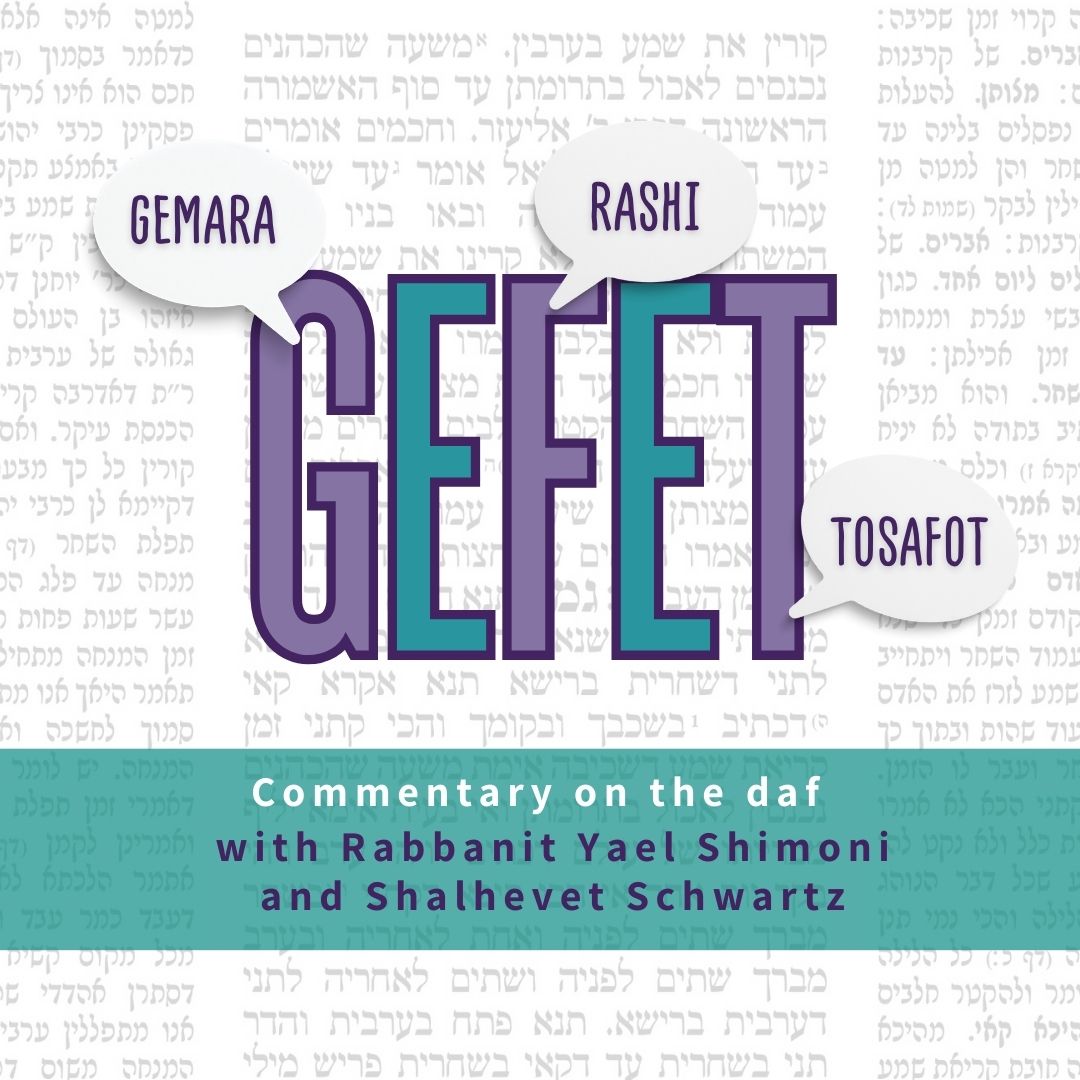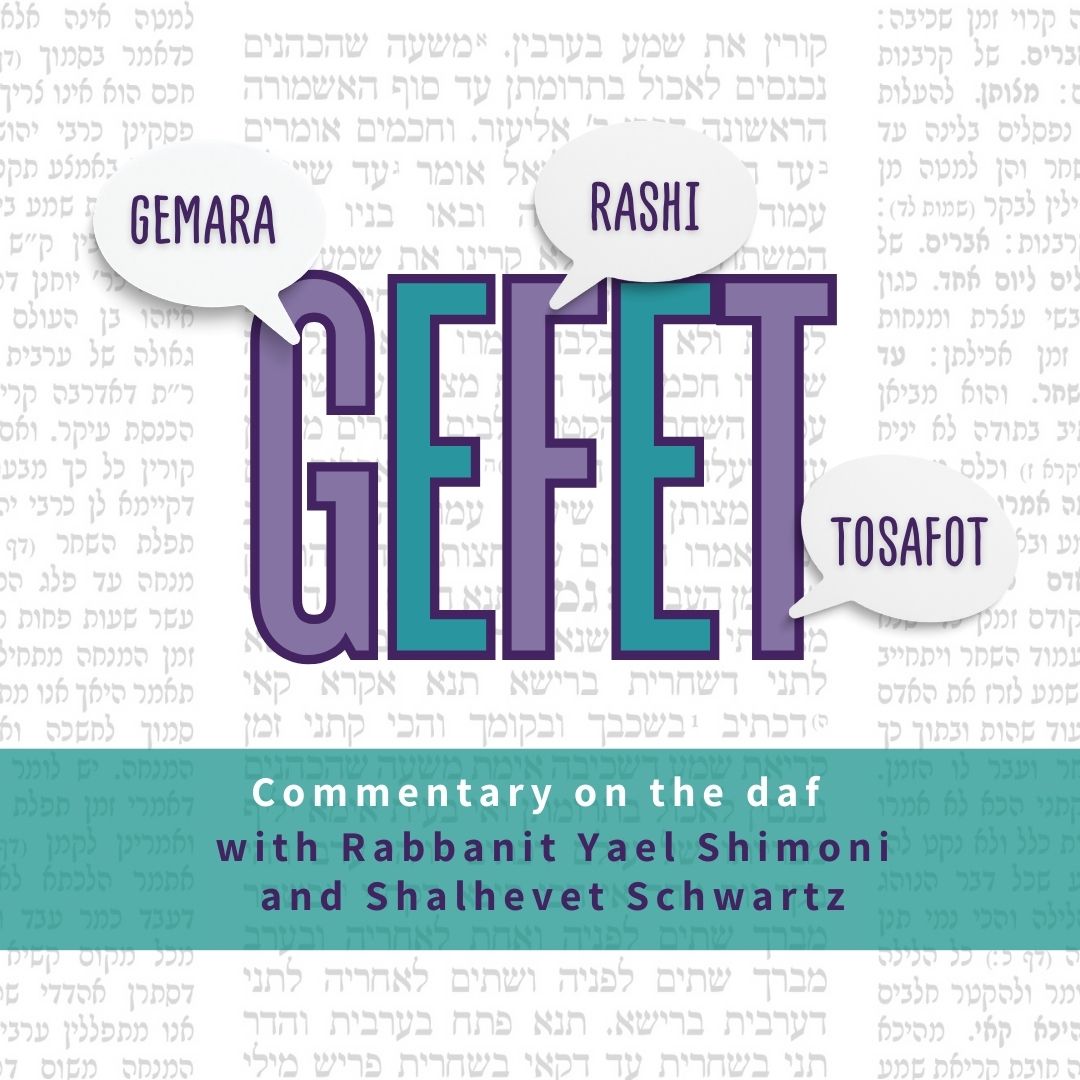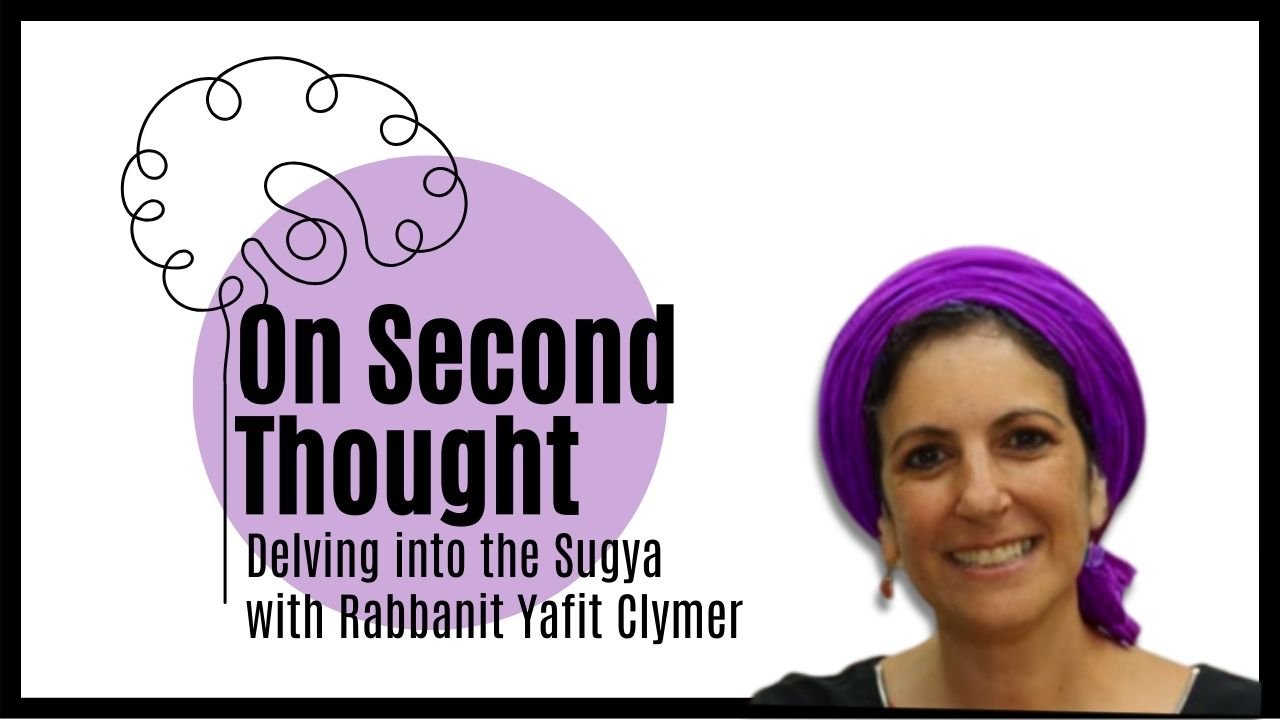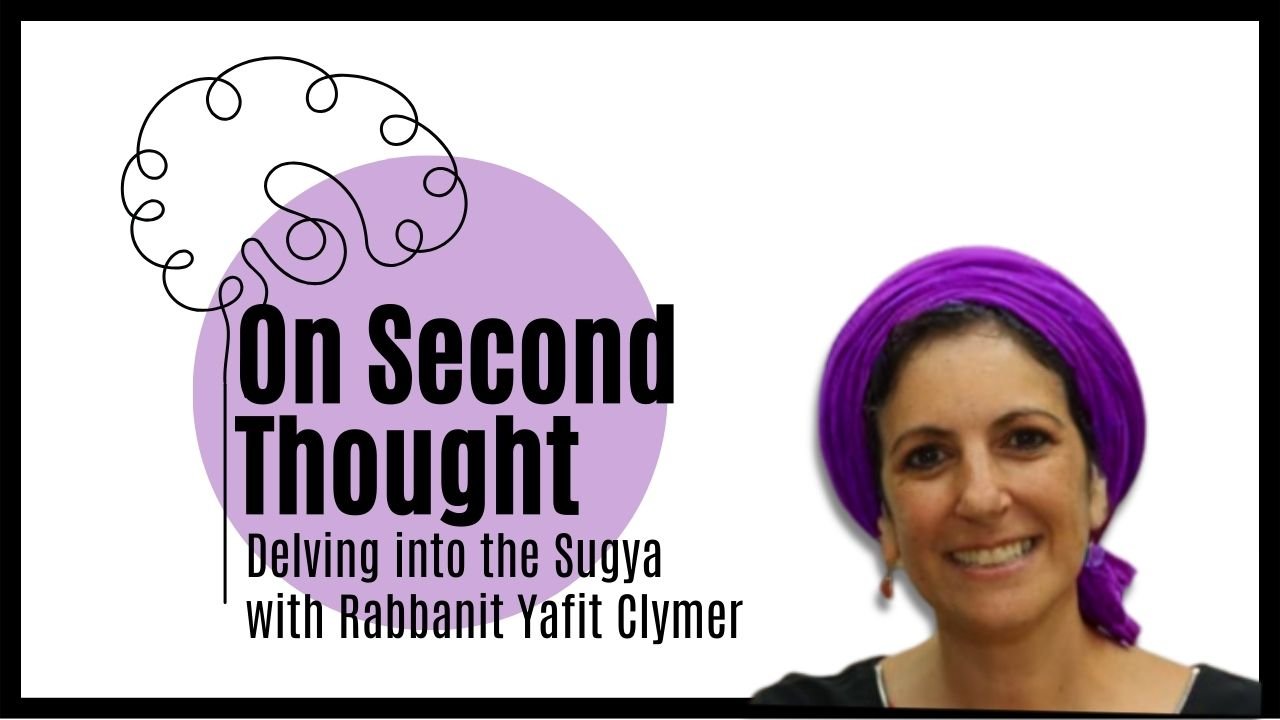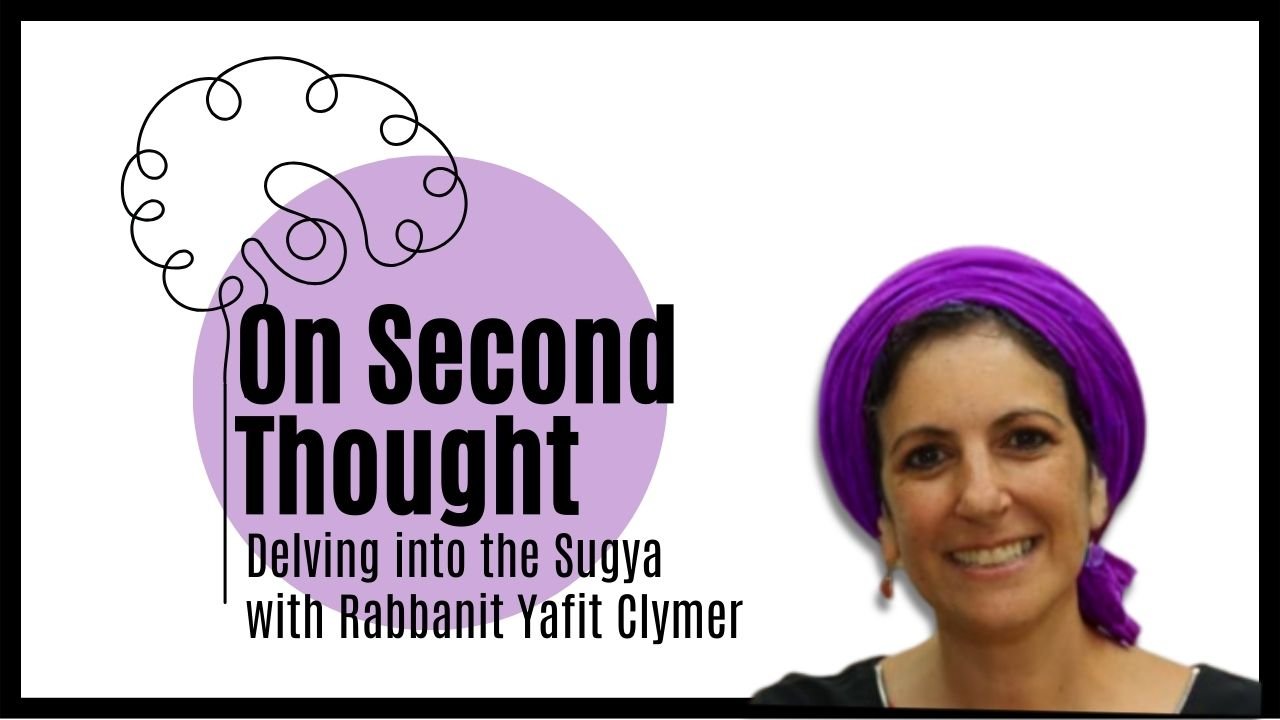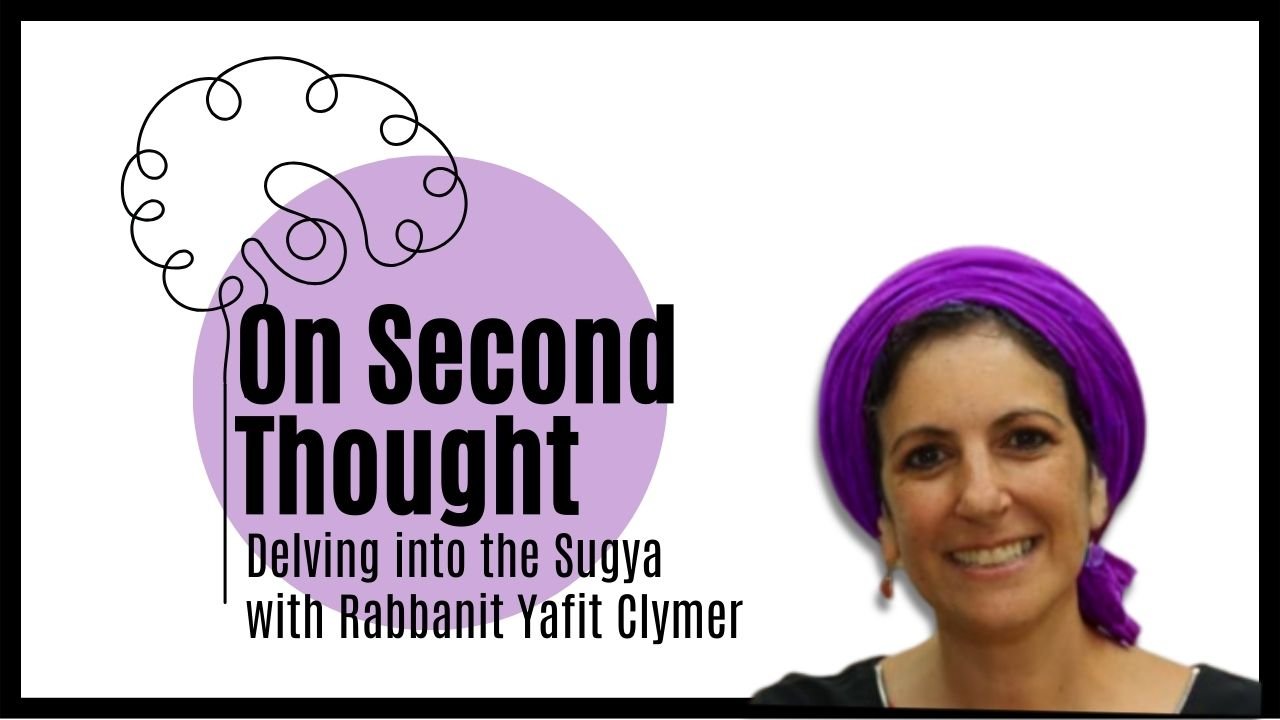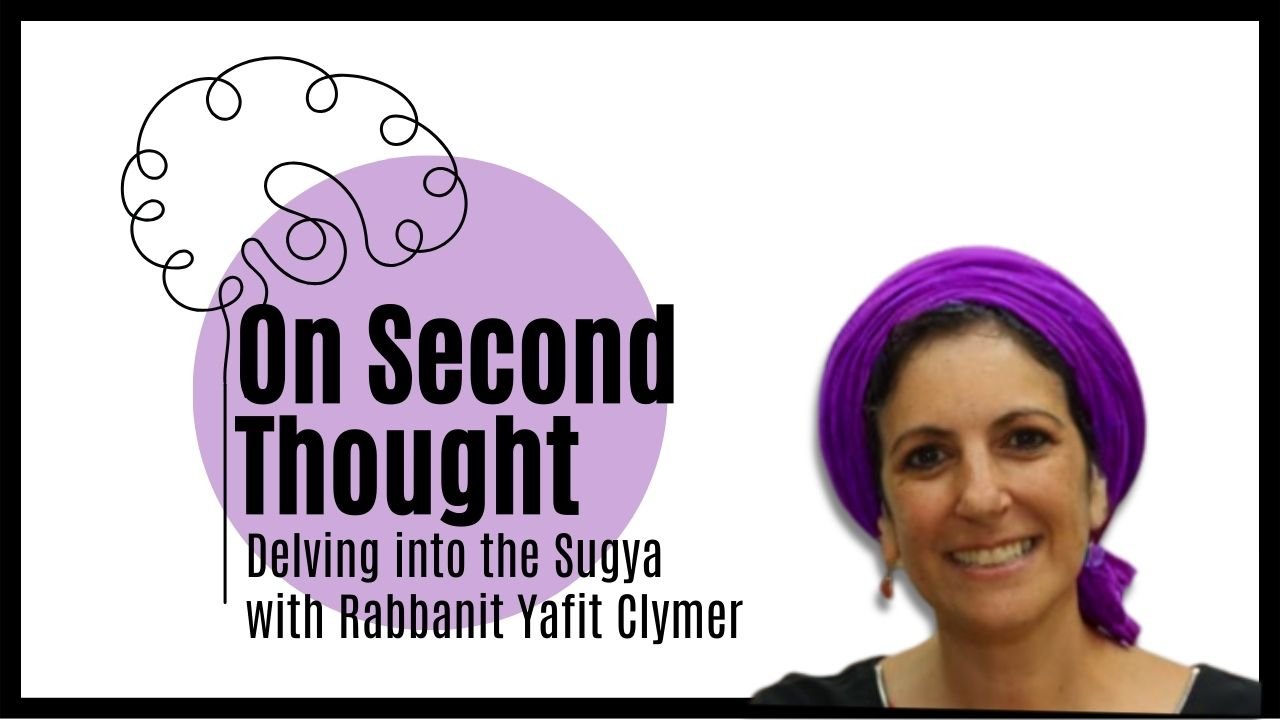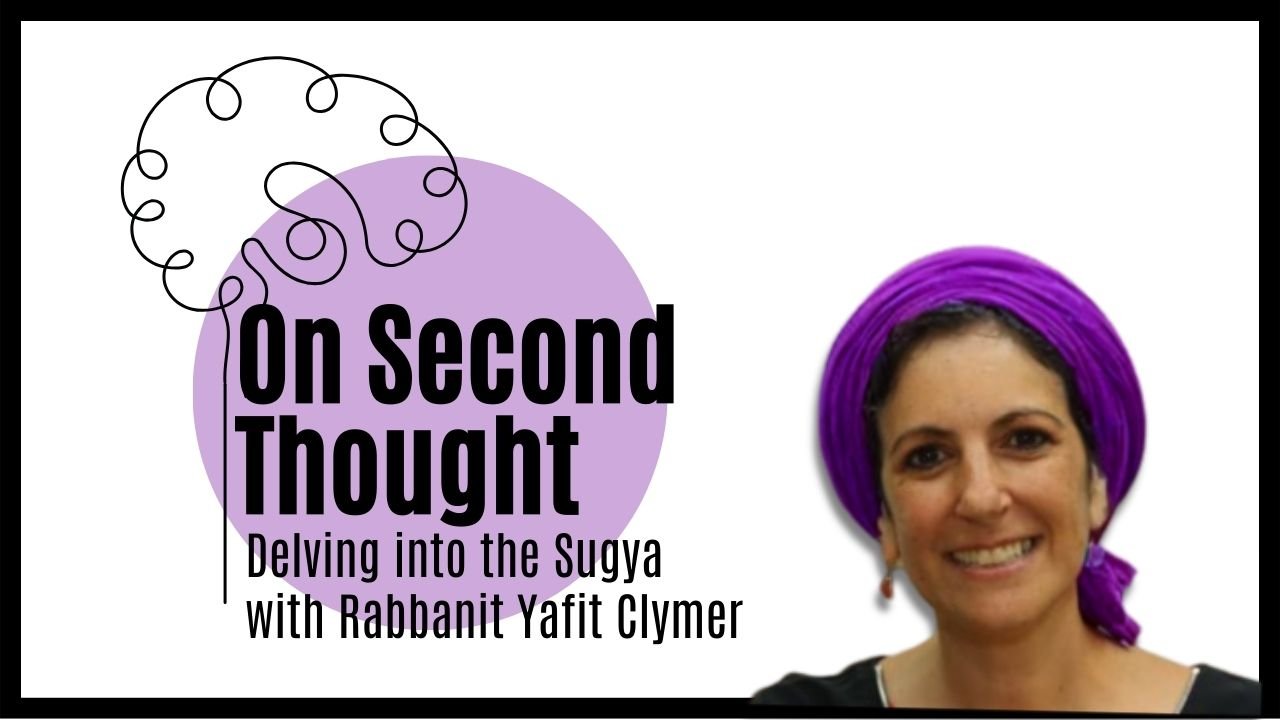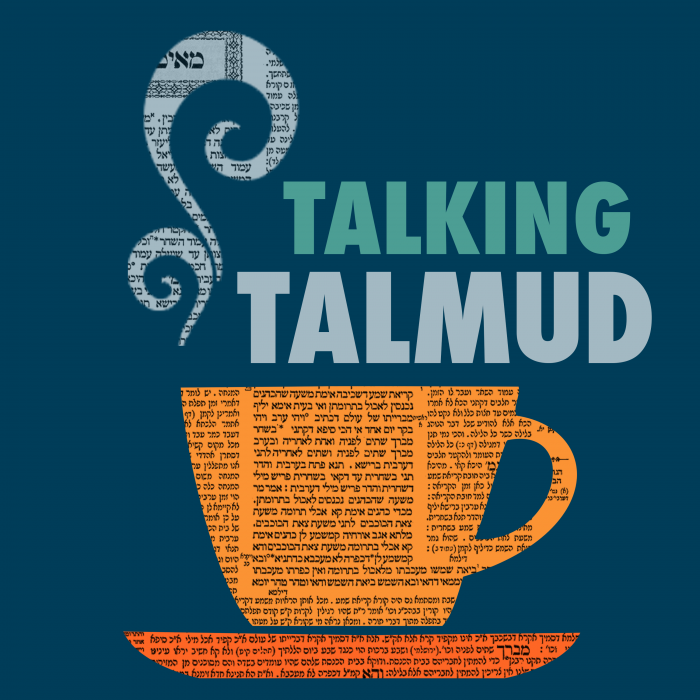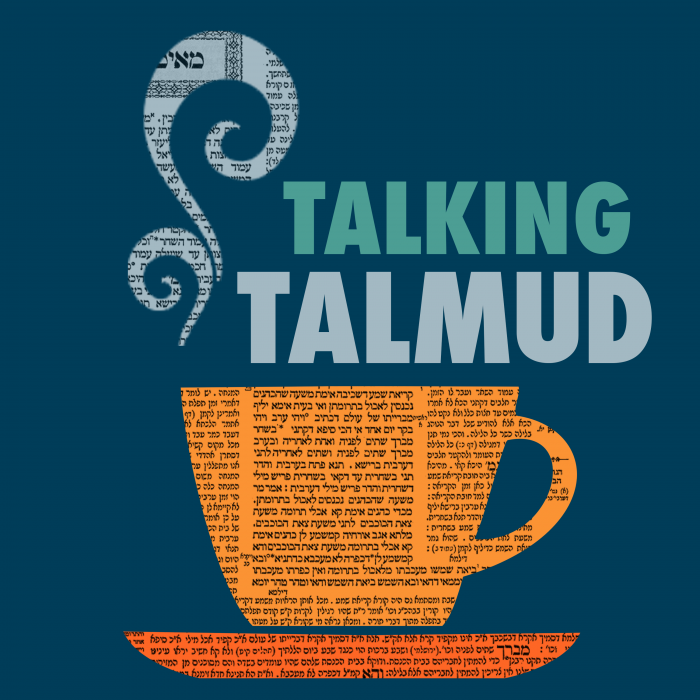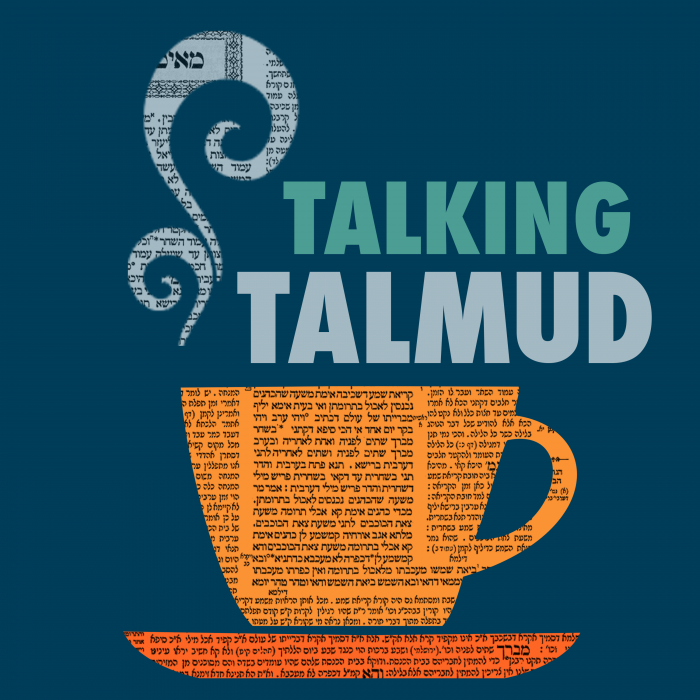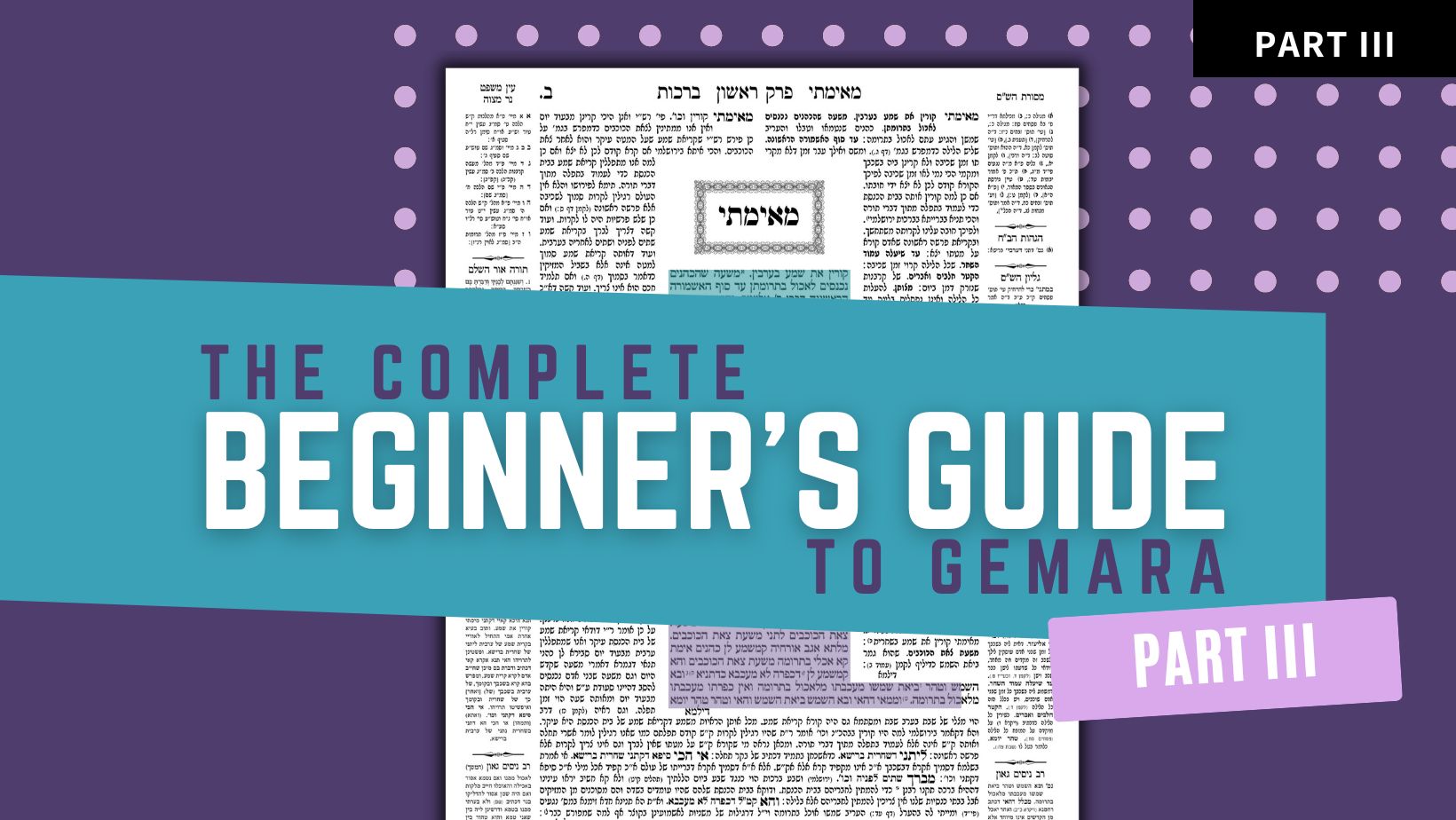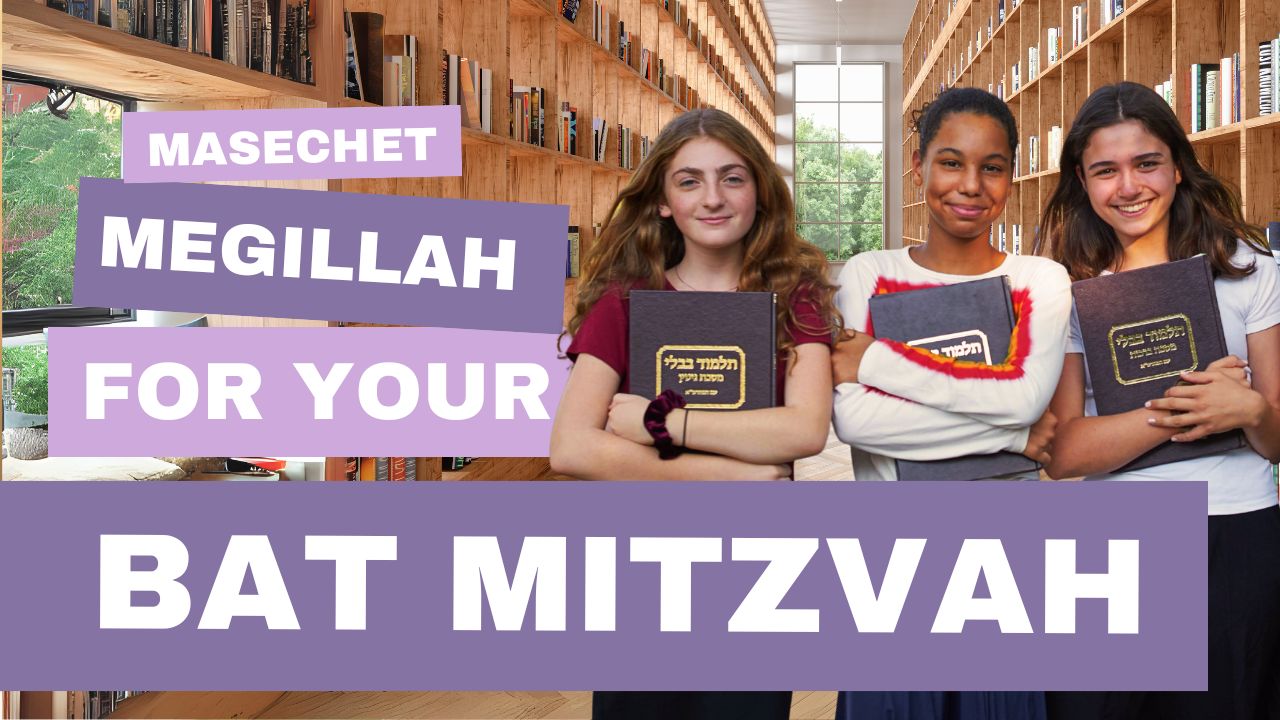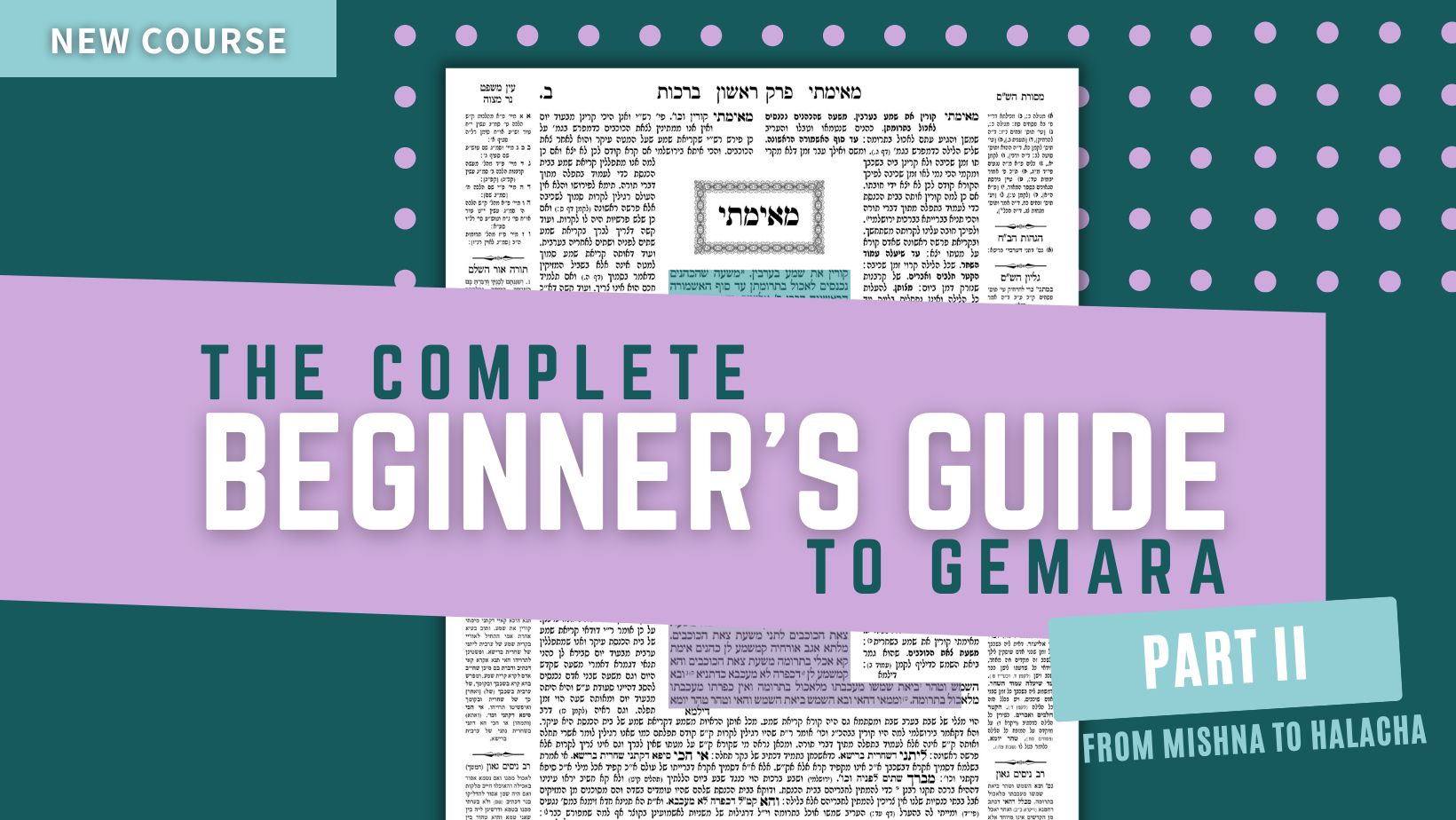
Hadran: Advancing Talmud Study for Women
Hadran supports Jewish women of all ages, backgrounds and skill levels with resources and inspiration to engage in Talmud study.
Zevachim 13
Rabbanit Michelle Farber
09.27.2025 | ה׳ בתשרי תשפ״וStart Studying Talmud
Daf Yomi
Get ‘on the same page’ with Jews around the world on a daily basis.
Masechet
Select a section of the Talmud to suit your learning interests and schedule.
Beyond the Daf
Delve deep with weekly classes and podcasts from top women scholars.
Courses
Develop your Talmud study skills with self-paced online courses.
Resources
Talmud, Your Way
Experience Talmud with daily or weekly shiurim from top women scholars, each with a different focus and flavor. There’s something here for everyone.
Recently added
Daf Yomi
Beyond the Daf
Din & Daf
A Daf of Their Own
Flashback
Gefet
On Second Thought
Daf Yomi: One Week at a Time
Talking Talmud
Beyond the Daf (HE)
Suggested for you
Your history
Talmud, Your Way
Experience Talmud with daily or weekly shiurim from top women scholars, each with a different focus and flavor. There’s something here for everyone.
Daf Yomi
Zevachim 13
This is the daf for Shabbat. For Friday’s daf, click here.
Seder Kodashim Kit – Order Form
The Mishna teaches that improper intent (lo lishma) during a sin offering or a Pesach offering disqualifies the sacrifice if the intent occurs during one of the key rituals: collecting the blood, walking it to the altar, or applying it to the altar. Rabbi Shimon disagrees regarding the act of carrying the blood, arguing that it is non-essential since the slaughtering can be performed adjacent to the altar, rendering the walking unnecessary.
The Gemara challenges the notion that intent during the collection of the blood can disqualify the offering, citing a braita that appears to contradict this. The resolution distinguishes between two types of improper intent: pigul (intent to consume the offering at an invalid time) and lo lishma (intent for the wrong type of offering). The braita addresses pigul, while the Mishna discusses lo lishma. However, this distinction is also questioned based on another braita concerning pigul. The issue is ultimately resolved by differentiating between the action to which the thought pertains and the action during which the thought occurs.
A further question is raised regarding the sin offering, whose blood is brought into the Sanctuary and applied to the altar: does pigul apply during the kohen’s act of dipping his finger into the blood in preparation for placing it?
Daf Yomi
Zevachim 12
Seder Kodashim Kit – Order Form
Ben Beteira maintains that a Pesach sacrifice slaughtered with the intent of a different offering on the morning of the fourteenth is also disqualified. Rabbi Elazar, citing Rabbi Oshaya, explains that Ben Beteira considers the morning a valid time for offering the Pesach sacrifice. Although the verse uses the phrase “bein ha’arbayim,” typically understood as “afternoon,” Rabbi Oshaya interprets it as “between two evenings,” encompassing the entire day.
Several challenges are raised against this interpretation, referencing the timing of the daily afternoon Tamid offering, the incense, and the lighting of the menorah. In each case, it is argued that a separate verse specifies that these rituals must occur specifically in the afternoon. After further scrutiny, Rabbi Oshaya’s interpretation is ultimately rejected.
Rabbi Yochanan offers an alternative understanding of Ben Beteira’s position: while the Pesach sacrifice cannot be slaughtered in the morning, that time is still considered “its time” for the purpose of disqualifying a sacrifice offered with the intent of a different offering. Since part of the day is designated for the Pesach, the entire day carries implications for intent.
Rabbi Abahu challenges this view, arguing that if an animal is designated in the morning or earlier, it becomes disqualified at that time, as it cannot be offered either as a Pesach or a peace offering. This prior disqualification would prevent the animal from being offered later in the afternoon, as it had already been rejected for a period of time. Rabbi Abahu, Abaye, and Rav Papa each propose possible resolutions to this difficulty.
Rabbi Zeira engages with Rabbi Abahu’s question, asking whether Rabbi Yochanan holds that live animals can be rejected from sacrifice—not only at the moment of slaughter. Rabbi Abahu affirms this and supports it with a ruling from Rabbi Yochanan, from which three principles regarding the rejection of offerings are derived, including that live animals can indeed be rejected from the altar.
The Gemara continues with additional statements from Rabbi Yochanan about sacrifices that become permanently disqualified, such as when a person renounces the religion or becomes a shoteh (mentally incapacitated).
Ben Azai holds that even a burnt offering brought with improper intent is disqualified. Rav Huna attempts to source this opinion from the Torah verse “olah hu” (“it is a burnt offering”). When this is rejected, the reasoning shifts to a kal va’chomer (a fortiori) argument: since a burnt offering is more stringent than a sin offering—being entirely consumed—it should be subject to stricter rules. However, this reasoning is also challenged, as both the Pesach and sin offerings have unique stringencies not applicable to burnt offerings.
Daf Yomi
Zevachim 11
The Gemara seeks to find a source for the opinion of the rabbis that the blood of the guilt offering whose blood is brought into the Sanctuary is not disqualified. Why is the guilt offering not treated like the sin offering? After the first attempt by a logical kal v’chomer argument is rejected, they learn it from a drasha from the verse relating to that law.
According to the rabbis’ opinion in our Mishna that a sin offering slaughtered with intent for another offering is disqualified, but a guilt offering is not, one can understand the comparison in a braita of two different types of meal offering – one to a sin offering (will be disqualified is offered for the wrong sacrifice) and one to a guilt offering (will not be disqualified. In the braita, this is derived from a verse, Vayikra 6:10. How does Rabbi Eliezer understand this verse, which differentiates between sin and guilt offerings? To answer the question, they quote a Mishna with a different differentiation. This leads to a further question as both sources quote Rabbi Shimon – how can he derive two different things from the same verse? This question is resolved as well.
Rabbi Eliezer’s opinion in our Mishna was derived from a verse that compared the guilt offering to a sin offering. The rabbis use that verse to derive that a guilt offering also requires smicha, leaning on the animal.
Rabbi Yochanan and Rabba explain that Rabbi Eliezer agrees with Yosef ben Honi’s position in the Mishna that an offering brought for a Pesach (on the 14th of Nissan) is disqualified as well. Rabba points out that he disagrees, though, about an offering brought with the intent of a sin offering and does not hold that it is disqualified. To prove this, a lengthy braita is quoted, featuring a debate between Rabbi Yehoshua and Rabbi Eliezer, as well as the logical arguments of Rabbi Yehoshua and Rabbi Eliezer’s attempts to disprove them. In the course of the discussion, it becomes clear that Rabbi Eliezer does not hold that an offering slaughtered with intent for a sin offering is disqualified.
Shimon ben Azaria holds that an offering brought with the intention of a higher level of sanctity is not disqualified, but one brought with the intention of a lower level is. The source for this is from Vayikra 22:15. Does he disagree on two counts and he holds that it also atones for the owner, or not? This question is left unanswered.
Rabbi Yehoshua and Ben Beteira disagree in the Mishna about a Pesach sacrifice that was slaughtered for the intent of a different sacrifice on the morning of the fourteenth will be disqualified as well. Rabbi Elazar, in the name of Rabbi Oshaya, explains that their disagreement is broader as they also disagree about whether a Pesach sacrificed slaughtered for its own sake will be accepted if it was slaughtered in the morning, meaning, is the morning also a valid time for bringing the Pesach sacrifice.
Daf Yomi
Zevachim 10
This is the daf for the second day of Rosh Hashana.
Rabbi Yochanan and Reish Lakish debate whether a Pesach offering or a sin offering becomes disqualified if it is slaughtered with the intent to sprinkle its blood for the sake of a different sacrifice. Their disagreement centers on whether the laws of lishma (proper intent) can be derived from the laws of pigul (disqualifying intent regarding timing), which would imply that a thought during one sacrificial action about a different action could invalidate the offering.
A parallel debate arises regarding idol worship: if one slaughters an animal with the intent to offer its blood to an idol later, does that render the animal prohibited for benefit? The question is raised why both cases need to be stated—why not derive one from the other? This leads to a deeper exploration of the distinctions between them.
Rav Dimi reports that Rav Yirmia brought a proof supporting Rabbi Yochanan’s view, while Rabbi Ila supported Reish Lakish. Rav Yirmia’s proof is based on a kal va’chomer, which undergoes two revisions after difficulties are raised. Rav Papa challenges Rabbi Ila’s proof, but the challenge is ultimately resolved.
In the Mishna, Rabbi Eliezer adds the case of a guilt offering that is disqualified if brought not lishma—with intent for a different sacrifice. A braita presents a dialogue in which Rabbi Yehoshua repeatedly rejects Rabbi Eliezer’s proposed reasons. After three attempts, Rabbi Eliezer finally offers an explanation that holds. The Gemara then revisits various lines in the braita for further analysis.
Seder Kodashim Kit – Order Form
Daf Yomi
Get ‘on the same page’ with Jews around the world on a daily basis.
Zevachim 13
This is the daf for Shabbat. For Friday’s daf, click here.
Seder Kodashim Kit – Order Form
The Mishna teaches that improper intent (lo lishma) during a sin offering or a Pesach offering disqualifies the sacrifice if the intent occurs during one of the key rituals: collecting the blood, walking it to the altar, or applying it to the altar. Rabbi Shimon disagrees regarding the act of carrying the blood, arguing that it is non-essential since the slaughtering can be performed adjacent to the altar, rendering the walking unnecessary.
The Gemara challenges the notion that intent during the collection of the blood can disqualify the offering, citing a braita that appears to contradict this. The resolution distinguishes between two types of improper intent: pigul (intent to consume the offering at an invalid time) and lo lishma (intent for the wrong type of offering). The braita addresses pigul, while the Mishna discusses lo lishma. However, this distinction is also questioned based on another braita concerning pigul. The issue is ultimately resolved by differentiating between the action to which the thought pertains and the action during which the thought occurs.
A further question is raised regarding the sin offering, whose blood is brought into the Sanctuary and applied to the altar: does pigul apply during the kohen’s act of dipping his finger into the blood in preparation for placing it?
Zevachim 12
Seder Kodashim Kit – Order Form
Ben Beteira maintains that a Pesach sacrifice slaughtered with the intent of a different offering on the morning of the fourteenth is also disqualified. Rabbi Elazar, citing Rabbi Oshaya, explains that Ben Beteira considers the morning a valid time for offering the Pesach sacrifice. Although the verse uses the phrase “bein ha’arbayim,” typically understood as “afternoon,” Rabbi Oshaya interprets it as “between two evenings,” encompassing the entire day.
Several challenges are raised against this interpretation, referencing the timing of the daily afternoon Tamid offering, the incense, and the lighting of the menorah. In each case, it is argued that a separate verse specifies that these rituals must occur specifically in the afternoon. After further scrutiny, Rabbi Oshaya’s interpretation is ultimately rejected.
Rabbi Yochanan offers an alternative understanding of Ben Beteira’s position: while the Pesach sacrifice cannot be slaughtered in the morning, that time is still considered “its time” for the purpose of disqualifying a sacrifice offered with the intent of a different offering. Since part of the day is designated for the Pesach, the entire day carries implications for intent.
Rabbi Abahu challenges this view, arguing that if an animal is designated in the morning or earlier, it becomes disqualified at that time, as it cannot be offered either as a Pesach or a peace offering. This prior disqualification would prevent the animal from being offered later in the afternoon, as it had already been rejected for a period of time. Rabbi Abahu, Abaye, and Rav Papa each propose possible resolutions to this difficulty.
Rabbi Zeira engages with Rabbi Abahu’s question, asking whether Rabbi Yochanan holds that live animals can be rejected from sacrifice—not only at the moment of slaughter. Rabbi Abahu affirms this and supports it with a ruling from Rabbi Yochanan, from which three principles regarding the rejection of offerings are derived, including that live animals can indeed be rejected from the altar.
The Gemara continues with additional statements from Rabbi Yochanan about sacrifices that become permanently disqualified, such as when a person renounces the religion or becomes a shoteh (mentally incapacitated).
Ben Azai holds that even a burnt offering brought with improper intent is disqualified. Rav Huna attempts to source this opinion from the Torah verse “olah hu” (“it is a burnt offering”). When this is rejected, the reasoning shifts to a kal va’chomer (a fortiori) argument: since a burnt offering is more stringent than a sin offering—being entirely consumed—it should be subject to stricter rules. However, this reasoning is also challenged, as both the Pesach and sin offerings have unique stringencies not applicable to burnt offerings.
Zevachim 11
The Gemara seeks to find a source for the opinion of the rabbis that the blood of the guilt offering whose blood is brought into the Sanctuary is not disqualified. Why is the guilt offering not treated like the sin offering? After the first attempt by a logical kal v’chomer argument is rejected, they learn it from a drasha from the verse relating to that law.
According to the rabbis’ opinion in our Mishna that a sin offering slaughtered with intent for another offering is disqualified, but a guilt offering is not, one can understand the comparison in a braita of two different types of meal offering – one to a sin offering (will be disqualified is offered for the wrong sacrifice) and one to a guilt offering (will not be disqualified. In the braita, this is derived from a verse, Vayikra 6:10. How does Rabbi Eliezer understand this verse, which differentiates between sin and guilt offerings? To answer the question, they quote a Mishna with a different differentiation. This leads to a further question as both sources quote Rabbi Shimon – how can he derive two different things from the same verse? This question is resolved as well.
Rabbi Eliezer’s opinion in our Mishna was derived from a verse that compared the guilt offering to a sin offering. The rabbis use that verse to derive that a guilt offering also requires smicha, leaning on the animal.
Rabbi Yochanan and Rabba explain that Rabbi Eliezer agrees with Yosef ben Honi’s position in the Mishna that an offering brought for a Pesach (on the 14th of Nissan) is disqualified as well. Rabba points out that he disagrees, though, about an offering brought with the intent of a sin offering and does not hold that it is disqualified. To prove this, a lengthy braita is quoted, featuring a debate between Rabbi Yehoshua and Rabbi Eliezer, as well as the logical arguments of Rabbi Yehoshua and Rabbi Eliezer’s attempts to disprove them. In the course of the discussion, it becomes clear that Rabbi Eliezer does not hold that an offering slaughtered with intent for a sin offering is disqualified.
Shimon ben Azaria holds that an offering brought with the intention of a higher level of sanctity is not disqualified, but one brought with the intention of a lower level is. The source for this is from Vayikra 22:15. Does he disagree on two counts and he holds that it also atones for the owner, or not? This question is left unanswered.
Rabbi Yehoshua and Ben Beteira disagree in the Mishna about a Pesach sacrifice that was slaughtered for the intent of a different sacrifice on the morning of the fourteenth will be disqualified as well. Rabbi Elazar, in the name of Rabbi Oshaya, explains that their disagreement is broader as they also disagree about whether a Pesach sacrificed slaughtered for its own sake will be accepted if it was slaughtered in the morning, meaning, is the morning also a valid time for bringing the Pesach sacrifice.
Zevachim 10
This is the daf for the second day of Rosh Hashana.
Rabbi Yochanan and Reish Lakish debate whether a Pesach offering or a sin offering becomes disqualified if it is slaughtered with the intent to sprinkle its blood for the sake of a different sacrifice. Their disagreement centers on whether the laws of lishma (proper intent) can be derived from the laws of pigul (disqualifying intent regarding timing), which would imply that a thought during one sacrificial action about a different action could invalidate the offering.
A parallel debate arises regarding idol worship: if one slaughters an animal with the intent to offer its blood to an idol later, does that render the animal prohibited for benefit? The question is raised why both cases need to be stated—why not derive one from the other? This leads to a deeper exploration of the distinctions between them.
Rav Dimi reports that Rav Yirmia brought a proof supporting Rabbi Yochanan’s view, while Rabbi Ila supported Reish Lakish. Rav Yirmia’s proof is based on a kal va’chomer, which undergoes two revisions after difficulties are raised. Rav Papa challenges Rabbi Ila’s proof, but the challenge is ultimately resolved.
In the Mishna, Rabbi Eliezer adds the case of a guilt offering that is disqualified if brought not lishma—with intent for a different sacrifice. A braita presents a dialogue in which Rabbi Yehoshua repeatedly rejects Rabbi Eliezer’s proposed reasons. After three attempts, Rabbi Eliezer finally offers an explanation that holds. The Gemara then revisits various lines in the braita for further analysis.
Seder Kodashim Kit – Order Form
Zevachim 9
This is the daf for the first day of Rosh Hashana.
A Pesach offering that is slaughtered outside its designated time with the intent of a different sacrifice is treated as a peace offering—regardless of which specific sacrifice the intent was for. The Gemara seeks the source for this ruling. Back on Zevachim 8, a verse concerning a peace offering was suggested as the basis, appearing to allude to the Pesach offering.
After raising a difficulty with this derivation, the Gemara offers a particular explanation, which is ultimately rejected. A second approach is then proposed, but it faces the same challenge as the first. Three possible resolutions are offered; the first is dismissed, while the third is subjected to four objections—all of which are successfully resolved.
The Gemara then raises a further question: perhaps the verse in question refers not to the Pesach offering, but to a guilt offering. After addressing that possibility, the Gemara probes deeper, suggesting that the verse may not refer to the Pesach offering at all. This concern is also resolved.
A statement of Mavog is introduced regarding a sin offering brought with improper intent. However, it is unclear what specific intent he refers to and what his ruling implies. Several interpretations are presented, each offering a different understanding of Mavog’s position than the one initially assumed.
Seder Kodashim Kit – Order Form
Zevachim 8
Seder Kodashim Kit – Order Form
If any of the four sacrificial rites of a sin offering – slaughtering, collecting the blood, carrying it, or sprinkling it – are performed with the intent of a different sacrifice or for a different owner, the offering is disqualified. The Gemara investigates the source of this law. Initially, it cites verses that establish the requirement to slaughter, collect, and sprinkle the blood with the correct intent, both for the appropriate sacrifice and for the proper owner, and that failure to do so invalidates the offering. However, these sources do not explicitly prove that intent for a different sacrifice disqualifies the offering, nor that slaughtering and collecting must be done for the correct owner.
The Gemara first attempts to derive this from verses concerning the sin offerings of a nazirite and a leper, but both are rejected due to unique stringencies in each case. It then explores combinations – nazirite and leper, nazirite and standard sin offering, or leper and standard sin offering – but each pairing is also dismissed, as each has its own distinctive stringency.
Ultimately, Rava derives the requirement to perform all rites with the correct intent, from both the perspective of the sacrifice and the owner, from a verse that juxtaposes the peace offering with the sin offering, as the source for the basic law of proper intent is found in the laws of the peace offering, as explained in Zevachim 4. The verses previously cited in the sugya are then reinterpreted to teach that without proper designation, the offering is invalid—based on the principle that in kodashim (sacrificial laws), repetition in the Torah indicates necessity (l’akev).
The proof from the verses above pertains to a standard sin offering. The Gemara then asks: how do we know the same applies to a sin offering brought for idol worship or to a sliding-scale offering (korban oleh veyored)? These cases are derived through comparative analysis with other offerings mentioned previously.
The discussion shifts to the case of a Pesach offering. If one designates an animal for the Passover sacrifice but slaughters it on a day that is not Pesach, the offering is not disqualified and is instead brought as a peace offering. The father of Shmuel cites a verse from Vayikra 3:6, which discusses peace offerings, as the source. However, a difficulty arises: the verse may only support the case where the animal was offered as a peace offering. If it were offered with the intent for a different sacrifice, it might be disqualified.
To address this, the Gemara explains that the term zevach in the verse encompasses other types of offerings. Yet this resolution is unsatisfactory, as it could still be argued that if the Pesach was offered with intent for any other sacrifice, it should be brought as that sacrifice, not necessarily as a peace offering. To resolve this, the Gemara presents two alternative derivations from the verse and proceeds to analyze their validity.
Beyond the Daf
Explore relevant and thought-provoking topics that arise from the daf with fresh weekly Beyond the Daf content.
Zevachim Daf 2-7 – Daf Yomi: One Week at a Time
Din & Daf: How Should We Understand the Central Role of Blood in the World of Korbanot?
Din & Daf
Conceptual Analysis of Halakha Through Case Study with Dr. Elana Stein Hain In each session, we will delve into conceptual explorations of halakhic phenomena.
Din & Daf: How Should We Understand the Central Role of Blood in the World of Korbanot?
Din & Daf: What is the Concept of שלא לשמה All About?
Din & Daf: A Decree that the Majority Cannot Fulfill
A Daf of Their Own
Thought-provoking Talmudic discussions in a friendly, accessible style with Rabbanit Shira Marili Mirvis and Rabbanit Hamutal Shoval
A Daf Of Their Own – Ruler or Leader: King vs. President
A Daf Of Their Own – Introduction to Masechet Horayot
A Daf Of Their Own – Heartfelt Intentions vs. Spoken Vows
Flashback
Flashback: a look into the reality of the Talmud. What was the time of the Talmud really like? How were the experiences different?
Gefet
Gemara, Perushim and Tosfot An in-depth (Iyun) Gemara shiur with Rabbanit Yael Shimoni and Shalhevet Schwartz Disclaimers: you do not have to be a daf learner to study Gefet. The texts are in Hebrew, the class teaching is in English. *In collaboration with Yeshivat Drisha
The Laws of Theft: The Same for Jews and Gentiles? – Gefet
When ‘I Didn’t Know’ Isn’t Enough: Torah Law vs. Natural Morality – Gefet
On Second Thought
On Second Thought: Delving Into the Sugya with Rabbanit Yafit Clymer
The Death Penalty in the Mishnah and Talmudic Era – On Second Thought
The Death Penalty in the Second Temple Period – On Second Thought
The Death Penalty in the Tanakh – On Second Thought
True to Ourselves, True to Others – On Second Thought
Damage by Sight, Privacy and a Prophet with a Closed Eye – On Second Thought
Daf Yomi: One Week at a Time
This shiur will allow you to connect to the worldwide phenomenon of Daf Yomi study, whether you learn the daf each day or just want to gain an overview of the entire Gemara.
Zevachim Daf 2-7 – Daf Yomi: One Week at a Time
Horayot Daf 2-8 – Daf Yomi: One Week at a Time
Avodah Zarah Daf 71-76 + Siyum – Daf Yomi: One Week at a Time
Avodah Zarah Daf 64-70 – Daf Yomi: One Week at a Time
Avodah Zarah Daf 57-63 – Daf Yomi: One Week at a Time
Avodah Zarah Daf 50-56 – Daf Yomi: One Week at a Time
Talking Talmud
A conversation on the daf yomi with Anne Gordon and Yardaena Osband
Makkot 15: When a Positive Commandment Corrects a Violation
Makkot 22: Not 40 Lashes, But 39 – And More Difficult Details
Beyond the Daf (HE)
Explore weekly shiurim in Hebrew covering the most thought-provoking topics that arise from the daf.
Suggested for you
Your history
Courses
Take a Course
Develop your Talmud study skills with free, self-paced online courses by experienced Gemara teachers. All courses are designed to be relevant for beginners, as well as more advanced learners.
Masechtot
Learn a Masechet
Take a personalized, self-paced trip through Talmud study by choosing a masechet (tractate) that matches your interests and schedule.
Support Women’s Talmud Study
Your donation to Hadran enables us to create more resources and to reach and inspire more women all over the world.
The Hadran Learners’ Tapestry
Meet the diverse women learning Gemara with Hadran.
Read their stories and add your own.






Register your free learner account now
With your free Hadran account, you can keep track of your learning options, choices and progress.
Progress tracker
Keep track of where you are in courses and masechtot.
Content updates
Follow the teachers you like. Get notified when they release new content.
Learning reminders
Receive reminders to help you keep up with your learning goals.
Account settings
Update your user and contact information.









